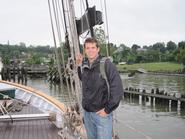
The mission of the Hudson River Sloop Clearwater, a nonprofit corporation headed by folk artist and cultural icon Pete Seeger, is to protect the waters of the Hudson River from pollution and degradation. This summer, Emerson Fellow Jacob Sheetz-Willard ’12 is researching how Pete Seeger’s Clearwater movement transcends environmental activism and becomes a cultural movement similar in organization to the civil rights movement of the 1950s and 1960s.
Sheetz-Willard’s working title is “‘Golden River:’ How Pete Seeger Transformed the Hudson” and he is working with James L. Ferguson Professor of History Maurice Isserman. Sheetz-Willard has been listening to Seeger’s music his whole life, but became immediately interested in the singer’s social activism after watching a documentary that talked about him as more than just a musician. It is well-known that Seeger was an outspoken opponent of segregation and the Vietnam War but Seeger was (and still is) deeply involved in a campaign to protect the integrity of the Hudson River.
Seeger’s 106-foot-long sloop, the Clearwater, was built and first launched on the Hudson in 1969, a year when the Hudson was rank with chemicals and sewage water and unfit to swim in. The Clearwater was a replica of sloops that sailed the Hudson in the 18th and 19th centuries, and it was Seeger’s hope that the Clearwater would attract visitors and inspire people to want to protect the Hudson River from further degradation. In the four decades since the sloop’s first voyage, Clearwater has grown into an organization with thousands of members that runs educational programs and holds fundraising festivals to raise money for initiatives to clean and protect the Hudson River for future generations.
Sheetz-Willard is a history major and environmental studies minor, so naturally his research is equal parts history and research on environmental activism. He is reading about folk music and the folk revival of the 1960s and looking into how Seeger’s environmental activism is set apart from other environmental movements. The message of Seeger’s music, as Sheetz-Willard explained, is often that the cause (in this case, environmentalism) is often bigger than the individual. In this way, Seeger’s take on environmental activism is similar to the way civil rights activists approached segregation in the 1950s and 1960s.
Sheetz-Willard has been on the Clearwater twice so far, once June 13 for the Strawberry Festival and also as a volunteer for the Great Hudson River Festival held June 18-20. Although he is not certain what the future may have in store for him, Sheetz-Willard plans to be involved in some sort of environmental activism, and thinks this is a valuable stepping stone. It’s great, he said, to see how, with an able leader, a community can become invested in a river and make real progress in preserving a magnificent resource for the future.
Jacob Sheetz-Willard is a graduate of Haverford Township Senior High School (Pa.)
Sheetz-Willard’s working title is “‘Golden River:’ How Pete Seeger Transformed the Hudson” and he is working with James L. Ferguson Professor of History Maurice Isserman. Sheetz-Willard has been listening to Seeger’s music his whole life, but became immediately interested in the singer’s social activism after watching a documentary that talked about him as more than just a musician. It is well-known that Seeger was an outspoken opponent of segregation and the Vietnam War but Seeger was (and still is) deeply involved in a campaign to protect the integrity of the Hudson River.
Seeger’s 106-foot-long sloop, the Clearwater, was built and first launched on the Hudson in 1969, a year when the Hudson was rank with chemicals and sewage water and unfit to swim in. The Clearwater was a replica of sloops that sailed the Hudson in the 18th and 19th centuries, and it was Seeger’s hope that the Clearwater would attract visitors and inspire people to want to protect the Hudson River from further degradation. In the four decades since the sloop’s first voyage, Clearwater has grown into an organization with thousands of members that runs educational programs and holds fundraising festivals to raise money for initiatives to clean and protect the Hudson River for future generations.
Sheetz-Willard is a history major and environmental studies minor, so naturally his research is equal parts history and research on environmental activism. He is reading about folk music and the folk revival of the 1960s and looking into how Seeger’s environmental activism is set apart from other environmental movements. The message of Seeger’s music, as Sheetz-Willard explained, is often that the cause (in this case, environmentalism) is often bigger than the individual. In this way, Seeger’s take on environmental activism is similar to the way civil rights activists approached segregation in the 1950s and 1960s.
Sheetz-Willard has been on the Clearwater twice so far, once June 13 for the Strawberry Festival and also as a volunteer for the Great Hudson River Festival held June 18-20. Although he is not certain what the future may have in store for him, Sheetz-Willard plans to be involved in some sort of environmental activism, and thinks this is a valuable stepping stone. It’s great, he said, to see how, with an able leader, a community can become invested in a river and make real progress in preserving a magnificent resource for the future.
Jacob Sheetz-Willard is a graduate of Haverford Township Senior High School (Pa.)
Posted June 22, 2010
